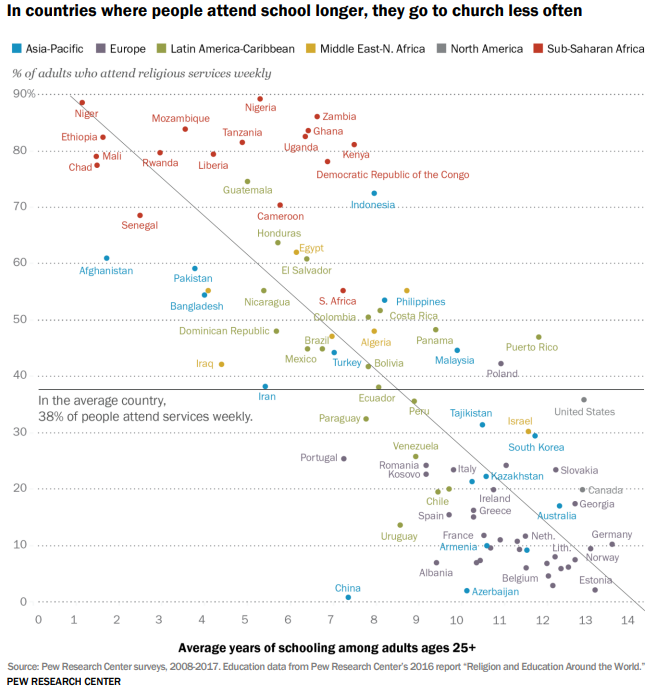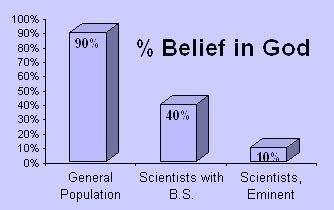Mass Education Versus Religion
https://www.humanreligions.info/education.html
By Vexen Crabtree 2022
The better people are educated, the less religious they are. In countries where education is improving, younger people's uptake of religion is lower1,2. Mass education is one of forces that works to undermine religious thinking and studies have found that a general "connectedness with god" is associated with lower levels of education3.
The more mysterious the world is, the more appealing religious answers are4. But the more we know about the world, the more we understand, the less likely we are to accept religious answers. People with minimal education are the most religious5, and also, the more religious a person is, the less they are interested in science6. Those with secondary or higher-level education are less religious5. Those with a degree in science are less than half as likely to believe in God as the general populace, and top-level scientists are nine times less likely7. This correlation isn't new and was also observed in ancient Greece by Polybius (2nd century BCE) who said that those who educate themselves know that "all this talk about the gods and the underworld is a myth"8.
A large poll in 2010 found that those who know most about religion include atheists and agnostics9, with religionists knowing the least. The more you know about the world, and about religion, the more likely you are to understand and accept natural and scientific facts about the world rather than accept religious answers.
- Religion and Intelligence
- General Education
- Science, Education and Religion
- Religious People are Least Educated on Religion
- Anti-Religious Forces: Specific Factors Fuelling Secularisation
- Links
1. Religion and Intelligence
#anti-religion #astronomy #atheism #belief #buddhism #christianity #education #god #intelligence #iq #national_academy_of_sciences #nobel_prize #religion #royal_society #science #shinto #stupidity #taoism #theism #UK #USA
The historical battles between religious institutions and science, such as those in physics, astronomy and biology, indicate there is something wrong with the religious approach to the study of reality. The underlying problem extends to negative effects on the individual intelligence of believers, and a related negative effect on educational achievements. Hardly any of the several-hundred Nobel Prize winning scientists have been Christians. Only 3.3% of the Members of the Royal Society in the UK and 7% the National Academy of Sciences in the USA, believe in a personal God. The more senior and learnéd the scientist, the less likely they are to believe in God. The children of highly religious parents suffer diminished IQs - averaging 7 to 10 points lower compared to their non-religious counterparts in similar socio-economic groups. As you would expect from these results, multiple studies have also shown that IQ is opposed to the strength of religious belief. 39 studies since 1927 (out of 43) have found that the higher one's intelligence, the less likely to hold religious beliefs.
The effect extends beyond individual countries and is visible inter-nationally. In countries where education is improving, younger people's uptake of religion is lower1, causing long-term trends towards secularisation. Countries with a higher rate of belief in God have lower average intelligence. All countries with high average intelligence have low national levels of belief in God. For countries where belief in God is over 80%, the average national IQ is 83 points. For those countries where stated disbelief in God (atheism) is greater than 20%, the national average IQ is 98 points. Instead of belief in God, countries with the highest IQs adhere to Far-Eastern atheist religions such as Buddhism, Taoism and Shinto.
For more, see:
2. General Education
#education #religion_and_education
It has long been noted that "religion declines in proportion to the rise in education"2. The correlation is clear both in studies looking at differences within single nations, and, international studies comparing different countries and regions.
“A 2005 Gallup International study called "Voice of the People" surveyed fifty thousand people in more than sixty-five countries and found that people with secondary or high-level education are less religious than people with no education or only a basic education.”
"50 Reasons People Give for Believing in a God" by Guy Harrison (2008)5
“Several research studies have been published on the statistical relationship between religiosity and educational level, or religiosity and IQ. Michael Shermer, in How We Believe: The Search for God in an Age of Science, describes a large survey of randomly chosen Americans that he and his colleague Frank Sulloway carried out. [...] Religiosity is indeed negatively correlated with education (more highly educated people are less likely to be religious). [...]
[Paul Bell in Mensa Magazine, 2002, reviewed all studies taken of religion and IQ. He concluded:]
"Of 43 studies carried out since 1927 on the relationship between religious belief and one's intelligence and/or educational level, all but four found an inverse connection. That is, the higher one's intelligence or education level, the less one is likely to be religious or hold "beliefs" of any kind."”
"The God Delusion" by Prof. Richard Dawkins (2006)6
Putting together ten years' worth of surveys, the Pew Research Center produced a comprensive illustration of the length of education versus the national rate of religiosity. The result is very clear:

Source: Pew Research Center10
It is easy to see how a cycle may emerge: Parents who push religion upon their children are more likely to generate a generation that doesn't have as much interest in science, and on average, keep their families in education for less time. This cycle is most readily shaken by education imposed from without, on a national scale. Public education, with a canon of minimum standards of mandatory material to be taught to children, is a good defence against communities cycling unchallenged into la-la land. Also, sometimes such as during the enlightenment, a general changing in culture can break the hold of specific forms of religious inhibition, and break the cycle.
For this reason, education has been tightly controlled by religious institutions wherever they have had the chance; Christian groups in the USA in the 1980s consistently attempted to, and often succeeded, in preventing schools from teaching topics that encourage critical thinking or 'secular humanism'11, and if they couldn´t succeed legally, they harassed teachers and used 'parent concern' groups to object to the content. It was of course used to suppress critical thinking, science education, women's right and sexual education, and all kinds of other things abhorred by the religious right in the USA.
3. Science, Education and Religion
 The more religious a person is, the less they are interested in science6. The opposition can be seen most starkly amongst advanced scientists and those with the very highest levels of scientific education. A Scientific American article by Prof Kyung (1999)7 contained an illustration, duplicated on the right, showing data from 39 studies since 1927: those with a degree in science are less than half as likely to believe in God as the general populace, and eminent scientists are nine times less likely.
The more religious a person is, the less they are interested in science6. The opposition can be seen most starkly amongst advanced scientists and those with the very highest levels of scientific education. A Scientific American article by Prof Kyung (1999)7 contained an illustration, duplicated on the right, showing data from 39 studies since 1927: those with a degree in science are less than half as likely to believe in God as the general populace, and eminent scientists are nine times less likely.
This correlation isn't new. A historian of ancient Greece, Polybius (200-118BCE) says that in his time, educated and enlightened men knew as "a matter of course that all this talk about the gods and the underworld is a myth which nobody among the better classes takes seriously" and that in political circles there was an active attempt to curb belief in gods8.
4. Religious People are Least Educated on Religion
#agnosticism #atheism #christianity #education #religious_studies #USA
It may seem paradoxical, but, the non-religious are some of the most educated about religion itself. A Pew Forum poll in 2010 found that educational level is the biggest predictor of knowledge of basics facts about Christianity and world religion in the USA: those who know most are atheists and agnostics9. In other words - the more you know about religion and the competing claims about truth made by various religions, the less likely you are to be religious.
5. Anti-Religious Forces: Specific Factors Fuelling Secularisation
Education is one the most commonly cited causes of the secularisation of the developed world. Here's an introduction to some other factors that are also contributing to Humankind's shedding of religious apparatus: